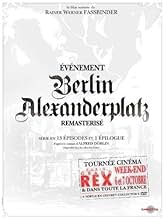This mega-movie is an expressionist, modernist masterpiece that combines the best of Wellesian cinema (expressionistic) with Godardian cinema (modernist). The (Godardian) voice-over snatches of random news items and medical health items (referenced in the prior 'review') are simply being faithful to Dobler's novel, which is a somewhat Germanic version of Joyce's Ulysses. But instead of the Joycian modernist take on the travels of Odysseus, Dobler's novel presented us with a modernist take on the Passion Play.
This film is not for simpletons. Just like a long, great novel
there will be stretches that will bore you a bit
and other stretches that are riveting and will break your heart.
Two major points:
1) Don't get too caught up with what some people see as a form of homo-eroticism between Franz Biberkopf and Reinhold. Although expressionistic, Fassbinder has presented the material with enough objectivity that different people will come away with different subtexts. Fassbinder has explained the film as a love story between Franz and Reinhold
but Fassbinder was bisexual.
Franz is a grown up naive child. One could easily see Franz's 'curiosity' about Reinhold as a longing for an absent father. Eva, the one constant in Franz's life, could represent his longing for an absent/replacement mother/big sister/protector. How else to explain Franz's reluctance to mate with her?
2) The two-hour epilogue contains an extended surrealistic pastiche that upsets 90% of the people who like the previous (more realistic) 13 hours.
Biberkopf's brain snaps like a twig! How better to explain the mixture of chemicals
the bad cocktail suddenly coursing through his head? It's brilliant in it's off-puttingness! Bad cocktails don't taste good! Some people don't understand how Lou Reed and Kraftwerk can be on the soundtrack when Franz (in insane delirium) is living in 1928:
People
that's what they call 'modernist'. That's what they call
'expressionist'. Were you expecting Robert Flaherty in a Fassbinder film?
Epilogue: See the film. If THE DECALOGUE is the great cinematic short story collection
BERLIN ALEXANDERPLATZ is the great cinematic novel.


































